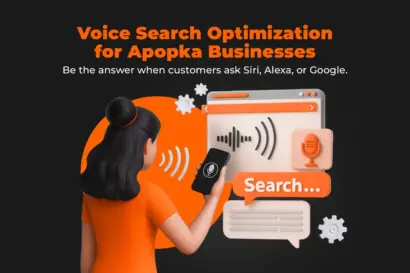Key Questions This Blog Will Answer
- What’s the difference between Shopify and WooCommerce?
- Which CMS is easier to use for Florida small business owners?
- How do hosting, pricing, and transaction fees compare?
- Which platform supports better SEO and speed?
- What integrations and marketing tools does each offer?
- Which ecommerce CMS is better for scalability?
- How secure are Shopify and WooCommerce for online stores?
- Which CMS suits Central Florida’s retail and tourism markets?
- What are the most common challenges with each?
- How should you choose the right CMS for your ecommerce goals?
Florida’s Ecommerce Boom
Ecommerce in Florida has exploded since 2020 — with Central Florida emerging as one of the top growth hubs for online retail. According to Statista’s Ecommerce Market Report 2025, Florida ranks among the top five U.S. states for small business ecommerce launches, with local retailers expanding into Shopify and WooCommerce faster than ever before.
Choosing the right Ecommerce CMS (Content Management System) isn’t just about convenience — it’s about scalability, security, and long-term growth. This Ecommerce CMS comparison breaks down Shopify and WooCommerce so Central Florida businesses can make a confident, informed choice.
Learn more:
What Is an Ecommerce CMS (and Why It Matters)?
An Ecommerce CMS is the platform that powers your online store — managing products, payments, content, and design without deep coding knowledge.
Both Shopify and WooCommerce dominate the CMS landscape:
- Shopify powers over 4.6 million online stores worldwide (BuiltWith, 2025).
- WooCommerce, built on WordPress, powers 28 % of all online stores globally (W3Techs Report 2025).
A CMS determines your:
- Website speed and UX (User Experience)
- SEO optimization and schema markup
- Integration flexibility
- Maintenance and scalability costs
Source:
Learn more:
What Is Page Speed Optimization?
Shopify Overview
Shopify is an all-in-one, hosted platform — meaning Shopify manages your hosting, updates, and security automatically.
Key Features:
- Drag-and-drop store builder
- Built-in payment gateway (Shopify Payments)
- 24/7 support and managed hosting
- 8,000+ apps in the Shopify App Store
- Integrated Product Schema and SEO settings
Best For: Businesses that want simplicity, reliability, and scalability without managing technical backend details.
Florida Use Case: A local fashion boutique in Florida launching a new online store can go live in 24 hours with Shopify’s ready-to-use templates and secure checkout options.
WooCommerce Overview
WooCommerce is an open-source WordPress plugin that transforms your site into a customizable ecommerce store.
Key Features:
- Fully self-hosted (you control the server)
- Free to install (pay for hosting and extensions)
- Complete design flexibility with WordPress themes
- Integrates with hundreds of Payment Gateways
- Open-source customization via PHP and APIs
Best For: Brands that want full creative and functional control — great for developers or agencies.
Florida Example: A handmade jewelry business in Mount Dora could use WooCommerce for blog-driven SEO and complete brand control.
Ease of Use
| Feature | Shopify | WooCommerce |
| Setup | Quick, guided setup | Manual setup with hosting |
| Customization | Templates and drag-and-drop | Fully customizable with code |
| Maintenance | Managed by Shopify | Self-managed |
| Learning Curve | Beginner-friendly | Intermediate to advanced |
Shopify wins in simplicity, but WooCommerce offers unparalleled flexibility for developers and SEO-focused brands.
Learn more:
What Is Front-End Development?
Pricing Comparison
| Cost Factor | Shopify | WooCommerce |
| Basic Plan | $39/month | Free plugin |
| Hosting | Included | $10–$25/month (avg) |
| Transaction Fees | 2.9 % + 30¢ (Shopify Payments) | Varies by payment processor |
| Themes/Extensions | $0–$300 | $0–$200 |
| Maintenance | None | Required |
Verdict: Shopify’s total cost is predictable but slightly higher. WooCommerce can be more affordable — but requires more setup and maintenance.
Statista 2025 Ecommerce Tools Survey reports that 67 % of small businesses prefer fixed-cost models like Shopify, while developers favor WooCommerce for flexibility.
Source:
SEO & Performance
Shopify
- Fast hosting optimized by default
- Built-in SEO fields and meta data editing
- Limited URL structure flexibility
WooCommerce
- More SEO control via Yoast SEO or Rank Math plugins
- Schema, rich snippets, and content depth options
- Performance depends on hosting quality
Winner: WooCommerce for SEO professionals; Shopify for beginners seeking simplicity.
Learn more:
Integrations and Scalability
Both platforms offer extensive integrations — from CRMs to shipping tools.
| Integration Type | Shopify | WooCommerce |
| Marketing Tools | Built-in email, Facebook, Google Ads | Integrates with HubSpot, Mailchimp |
| Inventory Sync | Native in admin dashboard | Requires plugins |
| CRM & Automation | Shopify Flow | WordPress CRMs like Jetpack, Zoho |
| Scalability | Built-in hosting scales automatically | Scales with hosting plan |
According to HubSpot Ecommerce Integration Report 2025, 78 % of marketers using Shopify reported faster automation setup times than WooCommerce users.
Security and Compliance
Shopify includes:
- Free SSL certificate
- PCI-DSS compliance
- Automatic updates
WooCommerce requires:
- Manual SSL setup (via hosting provider)
- Maintenance of plugins for security
- GDPR compliance through plugins
For businesses handling sensitive customer data, Shopify offers better built-in protection, while WooCommerce allows deeper control with additional configuration.
Learn more:
What Is Web Accessibility (ADA Compliance)?
Florida Focus: Local Ecommerce Trends
Florida’s ecommerce economy thrives on tourism, retail, and hospitality. Shopify’s simplicity benefits quick-turn industries like boutiques and restaurants, while WooCommerce suits content-heavy businesses such as real estate and local artisan shops.
Regional Insight:
The Florida Chamber of Commerce 2025 Report notes a 31 % year-over-year increase in small ecommerce startups — especially in Central Florida counties like Orange, Seminole, and Osceola.
Source:
Florida Chamber of Commerce 2025 Report
Cost Breakdown Summary
| Expense Category | Shopify | WooCommerce |
| Hosting | Included | $10–$25/month |
| Security | Included | Optional (SSL ~$5/month) |
| Maintenance | None | Manual |
| App Integration | $0–$200 | $0–$100 |
| Developer Costs | Minimal | Moderate–High |
| Support | 24/7 | Community-based |
Case Study: Florida Retail Example
Business: “The Sunshine Market,” an Orlando-based artisan shop
Challenge: Moving from Etsy to a self-hosted ecommerce store.
- Tried WooCommerce for flexibility but faced hosting complexity.
- Switched to Shopify for integrated shipping and payments.
- Result: Launched in 3 days, +62 % increase in online orders, and lower cart abandonment.
Learn more:
What Is Conversion Rate Optimization (CRO)?
What Is Shopping Cart Abandonment?
Conclusion: Choosing the Right Ecommerce CMS for Central Florida
For most Florida small businesses, Shopify offers the fastest path to launching and scaling a reliable store. However, WooCommerce provides unmatched freedom for those who value full control and open-source flexibility.
Your choice depends on budget, skill level, and long-term goals.
- Want simplicity? Choose Shopify.
- Want flexibility? Go WooCommerce.
Either way, the Florida ecommerce market is growing — and your CMS is the engine that powers your online success.
Ready to start your online store?
Request an Ecommerce CMS Consultation →
Explore our Florida service area or book a strategy call to stay ahead.
Explore Related Services
- Local SEO Optimization Florida
- Web Development Florida
- Shopify Website Development Florida
- Logo and Branding Florida
- Social Media Advertising Florida
- AdManager Facebook Florida
- Search Engine Positioning SEO Florida
FREQUENTLY ASKED QUESTIONS
1. What is the main difference between Shopify and WooCommerce for Florida businesses?
In this Ecommerce CMS comparison for Florida stores, Shopify is a hosted, subscription-based platform that manages hosting, updates, and security automatically. In contrast, WooCommerce is a self-hosted WordPress plugin offering full customization, flexibility, and open-source control. Florida businesses that value simplicity and fast setup often choose Shopify, while those seeking deep design control and scalability prefer WooCommerce for its open, developer-friendly ecosystem.
2. Which platform is cheaper for small Florida businesses?
For Florida small businesses, WooCommerce appears cheaper upfront because it’s free to install. However, it requires separate hosting, SSL certificates, and paid extensions for advanced features. Shopify has a predictable monthly cost starting at $39, covering hosting, support, and essential tools. For Florida startups managing multiple products, Shopify’s bundled features reduce maintenance time, while WooCommerce offers long-term savings for businesses with access to affordable web hosting.
3. Which CMS offers better SEO performance for Florida ecommerce stores?
When comparing Shopify and WooCommerce for SEO in Florida, WooCommerce offers deeper control through plugins like Rank Math and Yoast, enabling advanced schema, metadata, and URL management. Shopify includes built-in SEO tools ideal for beginners. Florida businesses targeting local search terms like “Florida boutique” or “Tampa surf shop” can rank effectively with either, but WooCommerce’s integration with SEO plugins provides a stronger foundation for content-rich sites.
Learn more:
4. Which platform is better for beginners in Florida?
For new entrepreneurs launching online stores in Florida, Shopify is typically the better choice. It offers an intuitive drag-and-drop builder, automatic security updates, and 24/7 support. WooCommerce provides more customization power but requires managing hosting, themes, and plugins manually. Many first-time Florida business owners choose Shopify to avoid technical complexity, then graduate to WooCommerce later as they scale and need full control over branding and performance.
5. How do Shopify and WooCommerce transaction fees compare for Florida stores?
In Florida, Shopify charges 2.9% + 30¢ per transaction using Shopify Payments. WooCommerce’s fees vary depending on the selected payment gateway (e.g., Stripe, PayPal, or Square). While WooCommerce allows more flexibility in choosing processors, Shopify’s built-in payment system ensures consistency. Florida merchants should compare gateway costs and transaction volume — high-volume stores often save more with WooCommerce’s customizable setup, while Shopify suits stable, mid-volume operations.
6. Which platform scales better for growing Florida online stores?
When scaling a Florida ecommerce business, Shopify’s cloud-based hosting and unlimited bandwidth handle traffic surges seamlessly. WooCommerce can scale equally well but requires server upgrades and maintenance. For example, an expanding Florida boutique might choose Shopify for ease, while a growing Florida-based agency might prefer WooCommerce for flexible backend control. Shopify simplifies scaling with minimal downtime, whereas WooCommerce offers the advantage of tailored, performance-optimized growth.
7. Which CMS integrates better with Florida’s tourism and retail businesses?
Florida’s tourism and retail businesses — from hotels to surf shops — benefit from strong CMS integrations. Shopify excels with booking and event plugins, built-in POS systems, and retail-friendly themes. WooCommerce supports the same via extensions but requires additional setup. For Florida brands in hospitality or retail, Shopify’s ease of integration with inventory and sales apps can save time, while WooCommerce’s flexibility appeals to agencies building custom solutions.
8. Is WooCommerce more customizable than Shopify for Florida developers?
Yes — WooCommerce offers more customization options, making it ideal for Florida developers and digital agencies. It provides full access to code, databases, and WordPress functionality, enabling endless theme and plugin combinations. Shopify, while less flexible at a technical level, supports custom apps and themes through its ecosystem. For Florida companies seeking complete design freedom or complex integrations, WooCommerce delivers unmatched creative and technical flexibility.
9. Which platform provides stronger security for Florida ecommerce sites?
For Florida ecommerce security, Shopify includes built-in SSL encryption, PCI-DSS compliance, and automatic updates, making it highly secure for small to mid-sized retailers. WooCommerce also offers strong protection but relies on the hosting provider and regular plugin updates. Florida store owners handling sensitive payment or customer data may prefer Shopify for simplicity, while advanced users can achieve equal protection on WooCommerce through managed hosting solutions.
10. Which CMS is best for Florida businesses overall?
Both Shopify and WooCommerce are excellent choices for Florida online stores. Shopify wins for speed, simplicity, and all-in-one functionality — perfect for new or medium-sized retailers. WooCommerce excels in customization and SEO flexibility, ideal for established Florida brands with technical resources. The best CMS ultimately depends on your budget, team skills, and long-term ecommerce vision within Florida’s competitive online retail landscape.




